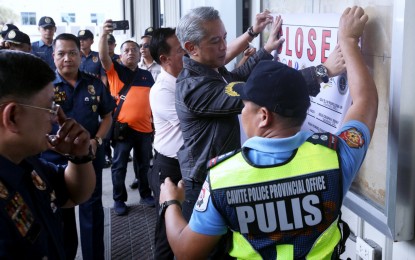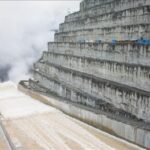MANILA — As midnight strikes on New Year’s Eve, the game will be over for Philippine offshore gaming operators (POGOs), which have become a scourge on society due to their links to a range of criminal activities.
Under Executive Order (EO) 74, signed by President Ferdinand R. Marcos Jr. in November, Philippine law enforcement agencies have begun cracking down on POGOs to ensure their operations cease by the end of 2024.
As a result, on December 17, Interior Secretary Jonvic Remulla, Executive Director of the Presidential Anti-Organized Crime Commission (PAOCC) Undersecretary Gilbert Cruz, Philippine Amusement and Gaming Corporation (PAGCOR) Chairman Alejandro Tengco, and Philippine National Police (PNP) Chief General Rommel Francisco Marbil shut down the country’s largest POGO complex, located on the site of the former Island Cove resort in Cavite province.
The Remulla family sold the resort to a developer in 2017. By 2019, the property began operating as a POGO hub.
The 33-hectare POGO facility is the largest in the country, employing 30,000 workers, half of whom are Filipinos.
The complex consists of 57 buildings, including employee dormitories, gaming centers, cafés, grocery stores, clinics, restaurants, spas, and beauty salons.
Meanwhile, the PAOCC is intensifying its campaign against guerrilla POGO operations nationwide.
Law enforcement will also inspect special-class business process outsourcing (BPO) facilities to ensure no POGO hubs are disguising their activities.
Guo, Quiboloy Fall
2024 also saw the downfall of two high-profile figures linked to a series of crimes—dismissed Bamban, Tarlac Mayor Alice Guo and Kingdom of Jesus Christ (KOJC) leader Apollo Quiboloy.
Guo was deported to the country after her arrest in Indonesia in September.
The suspended mayor, along with her siblings Wesley and Sheila and their parents, had previously been arrested by the Senate for refusing to appear at an investigation into Zun Yuan Technology Inc, a Philippine offshore gaming operator (POGO) hub in Bamban that authorities raided in March.
The investigation also raised questions about the dismissed mayor’s citizenship after Philippine authorities discovered her fingerprints matched those of a Chinese national named Guo Hua Ping.
In an August 12 ruling, the Ombudsman dismissed Guo from service for gross misconduct and permanently barred her from holding public office.
This followed charges filed by the DILG against Guo for her alleged involvement in POGO activities.
Guo and her accomplices face charges of qualified human trafficking in connection with a June raid on a POGO hub in Bamban, Tarlac, where 800 Filipino and foreign workers were rescued.
In September, non-bailable qualified human trafficking charges were filed at the Pasig Regional Trial Court (RTC) against the dismissed Guo and 13 others.
Apart from Guo, the Department of Justice also charged Dennis Cunanan and 12 other executives and incorporators of three companies allegedly serving as Guo’s business partners.
Meanwhile, Quiboloy was arrested on September 8 at the KOJC compound in Davao City after a manhunt lasting over two weeks.
Quiboloy currently faces a non-bailable human trafficking charge. He is also accused of child and sexual abuse, along with five of his aides.
Following his arrest, his lawyers immediately filed a petition for hospital or house arrest due to his medical history, including two prior heart surgeries.
The court denied the
Island Cove resort
Island Cove Resort is a leisure destination located in Kawit, Cavite, Philippines, known for its recreational facilities, hotel accommodations, and scenic views of Manila Bay. Established in the late 20th century, it was a popular getaway for families and tourists, offering amenities such as swimming pools, a golf course, and event venues. While it temporarily closed in the 2010s, there have been efforts to revitalize the resort and restore its former appeal.
Philippine offshore gaming operator facility
A **Philippine Offshore Gaming Operator (POGO) facility** is a licensed establishment in the Philippines that offers online gambling services to customers outside the country. These facilities became prominent in the mid-2010s, contributing to the economy but also raising concerns over illegal activities, such as money laundering and human trafficking. The Philippine government has since implemented stricter regulations to address these issues while maintaining the industry’s economic benefits.
Kawit, Cavite
Kawit, Cavite, is a historic town in the Philippines, best known as the birthplace of Philippine independence. It was here, in the Aguinaldo Shrine (home of General Emilio Aguinaldo), that the Philippine Declaration of Independence was proclaimed on June 12, 1898. Today, Kawit preserves its rich heritage through well-maintained landmarks and cultural traditions tied to the country’s revolutionary past.
Bamban, Tarlac
Bamban is a municipality in the province of Tarlac, Philippines, known for its agricultural lands and historical significance during World War II. It was a strategic location during the war, with remnants of old railways and tunnels used by Japanese forces still present today. The town also reflects a mix of Filipino and Kapampangan cultures, contributing to its unique local heritage.
Zun Yuan Technology Inc
Zun Yuan Technology Inc appears to be a technology company, but there is limited publicly available information about its history or cultural significance. If it is a contemporary business, it may specialize in areas like electronics, software, or IT services, though specific details would require further research. Without more context, it is difficult to provide a detailed summary of its background or impact.
Kingdom of Jesus Christ (KOJC) compound
The Kingdom of Jesus Christ (KOJC) compound is the headquarters of a Philippine-based Christian megachurch and religious movement founded by Pastor Apollo C. Quiboloy in 1985. Located in Davao City, the sprawling complex serves as the center of the KOJC’s activities, which emphasize Pastor Quiboloy’s teachings as the «Appointed Son of God.» The site has drawn both followers and controversy, particularly regarding its leader’s legal and political issues in recent years.
Davao City
Davao City is the largest city in the Philippines by land area and a major economic hub in Mindanao. Founded in 1848 as a Spanish settlement, it later became a key trading and administrative center under American rule. Today, it is known for its vibrant culture, natural attractions like Mount Apo, and as the hometown of former Philippine President Rodrigo Duterte.
Pasig Regional Trial Court (RTC)
The Pasig Regional Trial Court (RTC) is a key judicial institution in Pasig City, Philippines, handling major civil and criminal cases under the country’s judicial system. Established as part of the Philippine judiciary’s regional trial courts, it plays a vital role in upholding justice in Metro Manila. While specific historical details about its founding are limited, it operates under the broader framework of the 1987 Philippine Constitution, which reorganized the judiciary.






